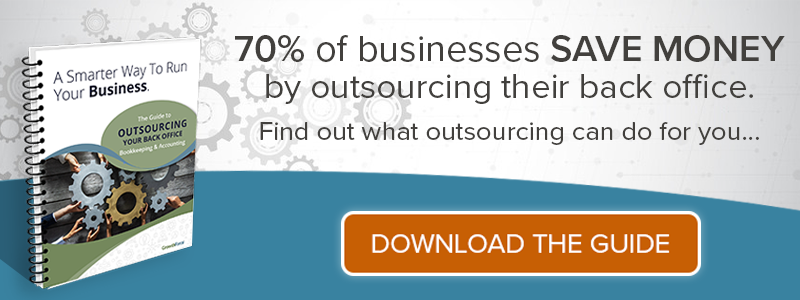5 min read


When you're running a service-based for-profit business, bookkeeping and accounting likely aren't part of your company's core value propositions.
However, that doesn't mean a strong accounting system isn't highly valuable, and necessary to run it well.
|
Key Takeaways
|
Your business simply can't function or execute a successful business strategy without a strong back office to support it and guide the decisions you make.
Regardless of your company's size, your back office should operate like a well-oiled machine, so it doesn't hold your business back and cost money and time from inefficiencies.
7 Signs Your Business Has Outgrown Its Bookkeeper
1. You’re involved in the Bookkeeping
As a business owner, it's your instinct to save money anywhere you can. However, you must consider whether spending a lot of time on bookkeeping and accounting, even just helping out, is actually a financially responsible use of your time.
How Is It Holding You Back?
If you're currently spending too much time doing this, it's highly likely that you are not doing what you do best, and in fact, spending your time on these kinds of tasks is probably costing way more than you think.
You're wasting time that could be spent on more valuable parts of your business: making leadership decisions, motivating your staff, and focusing on improving your company's core value proposition. Imagine how successful your company could be if you only spent your time on tasks that drive revenue.
If you're doing more than signing the checks, then it's time to re-evaluate your back-office.
2. Your Back Office Lacks Checks and Balances
If your accounting department is just you and a bookkeeper, there's no proper internal controls and proper separation of duties.
If you don’t have a second set of eyes overseeing your business’s bookkeeping and accounting, you risk mistakes, inefficiencies, or worse, internal fraud. Unfortunately, internal fraud disproportionately affects small businesses, as businesses with fewer than 100 employees incur nearly double the fraud-related losses compared to businesses with more than 100 employees. [1]
How Is It Holding You Back?
No matter how trustworthy you think your back-office employees are, a business must have checks and balances in place to protect your employees and your bottom line from avoidable losses due to costly mistakes or internal fraud.
The fundamental way in reducing fraud in your small business is setting up internal controls. Having additional pairs of eyes checking for anomalies provides an extra layer of protection—not only in terms of trying to prevent fraudulent activity but to increase your business’s overall financial accuracy.
2. Reporting Problems
Many small business owners only focus on getting the financial reports they understand. As a result, they often only see a balance sheet or a profit and loss statement once a year at tax time. If you receive more frequent reports, then you're a step ahead, but you still need to have full confidence and understanding in the numbers you receive if they're going to do you any good.
An inefficient accounting system, with data that doesn't seem accurate, and does not provide actionable reports to help you make decisions, is useless. If you find that you can't rely on your processes, numbers and financial reports, or get them timely and consistently, then you have a major problem with your existing accounting system.
Tommy Mello of A1 Garage Doors Services discusses the impact of detailed, management reportings.
Without the ability to get accurate numbers when you need them, you simply can't make good decisions for your company. You'll have no clear picture of cash flow or costs. With a reliable reporting system in place, you'll always have a clear understanding of the state of your business's finances. You'll be able to plan for the future, avoid pitfalls, improve cash flow, and make data-driven decisions based on accurate, up-to-date information.
If you don’t receive management reporting each month you could be missing out on information that can help your company grow or prevent you from implementing costly programs that don’t provide an ROI.
4. You're Using an Accounting System That is Not Optimized
Are you still relying on paper and manual data entry for expense reporting/tracking? Do you pay bills with paper checks? Do you still send paper invoices? Do you have automations to allocate and track everything going in and out of your accounting system?
How Is It Holding You Back?
An outdated bookkeeping and accounting system puts your business at risk of dealing with losses and inaccuracies due to human error. Additionally, you're likely incurring higher costs than necessary by missing out on early payment discounts and experiencing cash flow problems while waiting for the slow receipt of invoice payments.
With a fully streamlined accounting system, you'll save time and employee costs associated with data entry and expense tracking. You'll also benefit from highly improved accounts payable and accounts receivable processes.
If your bookkeeper doesn't have up-to-the-minute information on the latest technology developed to serve the accounting industry, then you're inevitably going to bleed money as a result of operating with an inefficient system.
5. Tax Season Is a Nightmare
Okay, no one enjoys paying taxes.
However, having a disorganized back office and accounting system can transform tax season from an inconvenience into a veritable annual nightmare. If you're all too familiar with the headache of last-minute receipt wrangling and expense categorization, then you've likely outgrown your bookkeeper.
How Is It Holding You Back?
Apart from the annual stress of preparing everything by tax (or audit) time, allowing your bookkeeping (expense tracking and categorization) to fall behind throughout the year means that the financial picture of your business is also out-of-date. The truly scary part of not knowing your business's current numbers is that you'll be forced to use last year's numbers to make important decisions about the challenges of today.
6. You Don't Want to Lose Your Bookkeeper
For many business owners, one of the primary barriers to seeking out a better back office solution is simply not wanting to let go of their bookkeeper. This individual has probably been with your company for a long time, and you have fostered a relationship with this person. Plus, they undoubtedly possess invaluable knowledge about your company's inner workings.
How Is It Holding You Back?
By keeping your bookkeeper in a bookkeeping position, you could be missing out on revenue and growth opportunities. Have you ever considered what kind of revenue their knowledge could generate in a different, higher-value position?
Instead of looking to completely replace your bookkeeper, consider taking steps to transition them into another position by giving them new responsibilities, chances to learn new skill sets, and opportunities for career growth. You'll empower your employee and maybe even surprise them with what they're able to do by promoting a bookkeeper into a role that generates income.
7. You Don't Make Data-Driven Business Decisions
If you run your business mostly on instincts, outdated information, and reactions to unforeseen events, then you're lucky to still be in business. A weak accounting system can only do so much for your company. Up to date financials, reported on a regular basis, are essential to management accounting and making data-driven decisions to achieve business success.
Whether you lack timely, accurate, or reliable numbers, you simply won't be able to make the right decisions for your business.
How Is It Holding You Back?
A better back office could produce not only financial reports required for compliance, but it could also generate timely, accurate management accounting reports filled with key performance indicators that can help you take control of your business drivers. As a result, you'll be able to make data-driven decisions to steer your company in the right direction, strengthen your profit margins, and increase your bottom line.
Should You Hire an In-House Accountant?
Hiring an in-house accountant (or over-paying for more services from your CPA) seems like the only option to the problems associated with outgrowing a bookkeeper. However, the actual costs and limited benefits of this rather than considering outsourcing options might surprise you.
The Costs
Firstly, there are the obvious expenses associated with bringing on an employee with an advanced accounting degree: a big salary, employee benefits, overhead. Plus, you must consider the expense of the actual hiring process and the time dedicated to bringing your new employee up to speed.
Additionally, you might be at risk of incurring high turnover costs for this position because you likely won't be able to offer your CPA many opportunities for career advancement.
According to the U.S. Small Business Administration, the cost to replace an employee goes up with the employee’s rank in the company. For example, to replace an entry level, non-skilled employee costs up to 50% of the employee’s annual salary; whereas, for a supervisor’s position, the turnover cost could soar up to 150% of the annual salary. [2]
As a result, you'll find your new accountant leaving sooner than expected for a better position elsewhere. Thus, the cost of hiring for an open accounting position will become a recurring expense. As a result, you'll wind up dedicating more resources and more of your own valuable time to the interviewing and hiring process.
Limitations
Hiring a single, in-house employee inevitably produces inconsistencies because people need time off. When your CPA falls ill or goes on vacation, your accounting department operations will inevitably come to a halt until they return.
With only one accountant or potentially a bookkeeper and an accountant staffing your back office, you still face fairly limited potential when it comes to fraud protection. Although you'll at least have two employees who can separate some of their duties, you still won't benefit from the complete checks and balances that an entire outsourced accounting team can provide.
Consistency and security are both important concerns, but the biggest opportunity you'll miss is having the benefit of an outside perspective from a team of industry experts. A team of outsourced accounting, bookkeeping, and business management accounting professionals can provide you with an objective perspective and insights into the strengths and weaknesses of your business that you're simply too close to see.
Is outsourcing core back office functions right for your business?



